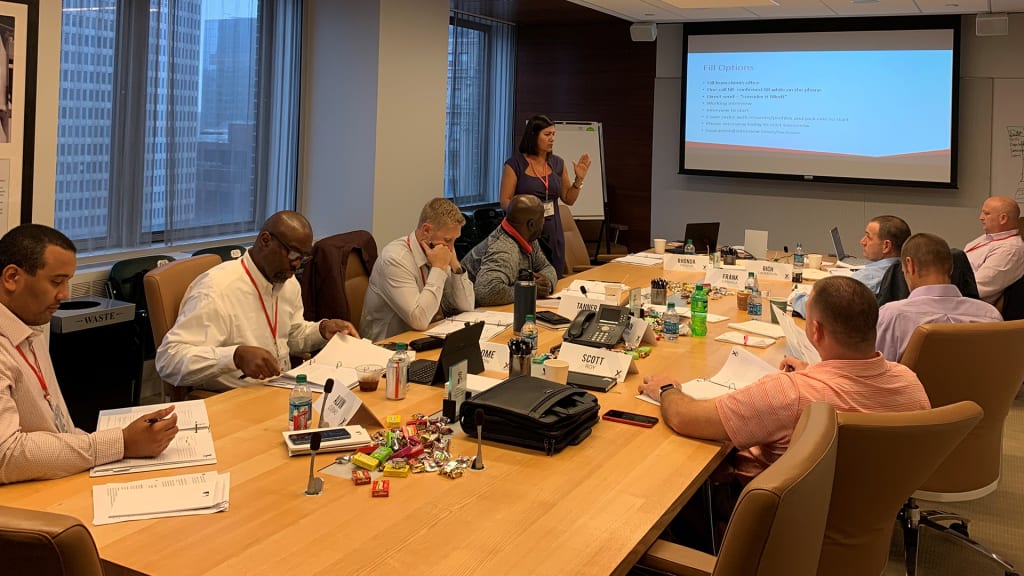
NEW YORK -- On Tuesday, in a conference room at Major League Baseball’s Office of the Commissioner, class was in session for a group of seven former Minor League Baseball players.
As part of a pilot program put together by MLB’s Baseball Assistance Team (B.A.T.), an organization whose goal is to help members of the baseball family become self-sufficient, these former Minor Leaguers, who were selected after several rounds of interviews and aptitude tests, took part in the second day of a three-day workforce readiness workshop aimed at preparing them for jobs in the field of recruiting.
In partnership with Xtra Point Group, a company designed to help athletes in transition find their niche and launch a career, B.A.T. created a curriculum that could aid these former ballplayers in bridging the gap between their playing careers and their professional careers. Xtra Point Group chief executive officer Rich Thompson led the seminar with a focus on relationship recruiting, teaching the group about making pitches, building contacts, gathering desk knowledge and developing target areas -- all while emphasizing the need to bring long-term business, not just short-term value to their respective companies.
Thompson, who has a connection to the former ballplayers with him being an ex-professional football player, understood the struggle that athletes face to “figure out what the next step is” and realized that they “fit really well with” the recruiting industry.
“This is an opportunity for us to provide them with an applicable and placeable skill where they can launch their career right away,” Thompson said. “... All of these athletes come with very rare skills, and exceptionally employable skills and experiences. We’re just trying to help them realize those skills, that they are actually ready and marketable for in-demand roles.”
Added Katie Lentz, B.A.T.’s administrator: “We felt that the partnership between sports and recruiting is a natural fit because there is a competitive aspect to both, there’s a teamwork aspect to both, and you have to practice a lot in both sports and recruiting as we’ve seen here during this program.”
While the seminar was mostly presented in the style of a lecture, Thompson also incorporated an interactive element in the form of role-playing scenarios so the former ballplayers could put their learning into action.
With prepared scripts that served as a point of reference, the group divided into pairs and performed mock calls to practice their pitches to potential clients, diversifying their approach depending on the nature of the conversation. They were then tasked with demonstrating their progress in front of the class, pitching Thompson as he pushed them to think on their feet and maintain their composure while pursuing their recruiting objective.
As Thompson explained after the session, the goal of the program was to teach the former ballplayers how to be competent, confident and conversational so that they could then be consultative with the customer base in the staffing industry. According to Scott Roy, one of the seven former Minor Leaguers, that’s what they took away from it.
“It’s more or less preparing you upfront for what you’re gonna see so you can walk in and be more successful right off the bat,” Roy said. “It really plays into our strengths as ballplayers. In the field, you need to have a lot of determination and grit, and be able to battle and keep making calls, and get to know people and place them in positions where they’re going to be successful so you can be successful. And I think that’s one of our strengths as ballplayers -- we know the grind. We get up for 140 games in 147 days in the Minor Leagues, long days, and you get to know people, you build relationships [and] communication is key on any team.”
For all seven former ballplayers, a job opportunity awaits at the end of the program, as Thompson has tapped into his network to establish relationships with companies in each of their geographic regions of the country. While they will still have to interview for the positions and make an impression in order to be hired, they will be prepared to take on the workforce in a way that they weren’t immediately after they hung up their gloves.
“I will say this, I am in a steady position in life, but I wasn’t for the longest time when baseball ended,” Roy said. “Baseball was everything I had ever known, and it was all I ever wanted. And when my career ended due to injuries three years in, I was lost in this world. I took dead-end jobs and didn’t have any motivation to push forward.
“So I think this type of training and this type of opportunity will be instrumental for guys coming out of baseball and finding themselves back in the real world, per se, some without their degree because they left early, some with their degree but five years removed from school and nobody wanting to take them on. I really think this is an awesome opportunity for guys like that to hit the ground running and get into a stable financial position.”